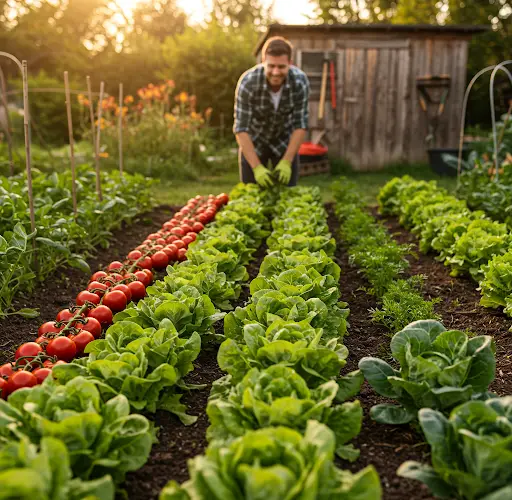A Beginner’s Guide to Organic Home Vegetable Gardening
Welcome to the world of organic home vegetable gardening—a space where health, sustainability, and self-sufficiency come together to create something truly rewarding. Growing your own vegetables organically allows you to enjoy fresh, chemical-free produce while building a deeper connection with nature. Whether you’re a beginner or looking to improve your existing garden, this guide will walk you through six essential tips to help you start and maintain a successful organic vegetable garden right in your backyard.
1. Build Healthy Soil
The cornerstone of any thriving garden is healthy soil. Instead of feeding plants directly with synthetic fertilizers, organic gardening focuses on feeding the soil, which in turn feeds the plants. Start by enriching your garden bed with plenty of organic matter such as compost, aged manure, or vermicompost. These materials improve soil texture, promote better drainage, and provide a wide range of nutrients.
Healthy soil is teeming with life—it contains countless beneficial microbes, fungi, and earthworms that break down organic material and make nutrients more accessible to plants. The more biologically active your soil is, the healthier and more resilient your plants will be.
2. Start Your Own Seeds
Starting your own seeds is a simple, cost-effective way to gain control over what grows in your garden. With a few basic supplies—seed trays, potting soil, and seeds—you can grow a wide variety of vegetables from scratch. Beginning seeds indoors allows you to get a head start on the growing season and ensures your plants are strong and healthy by the time they’re ready to be transplanted outdoors.
This method also gives you the opportunity to grow heirloom or specialty varieties that may not be available at your local garden center. As your seedlings mature, they will already be accustomed to your care, making for an easier transition to the garden.
3. Attract Pollinators
Pollinators such as bees, butterflies, and other beneficial insects are essential to a productive vegetable garden. They help plants set fruit and reproduce, making them vital allies in your organic garden. To attract these helpful creatures, plant a variety of nectar-rich flowers alongside your vegetables.
Native flowers such as sunflowers, lavender, cosmos, and calendula are excellent choices. They not only attract pollinators but also add beauty and biodiversity to your garden. Be sure to avoid using pesticides, which can harm pollinators, and aim for a diverse planting layout to provide food and habitat throughout the growing season.
4. Use Compost Tea and Homemade Organic Fertilizers
One of the best ways to naturally nourish your garden is by using compost tea. This nutrient-rich liquid is made by steeping well-aged compost in water for several hours or days, allowing beneficial microbes and nutrients to dissolve into the liquid. Once prepared, compost tea can be applied directly to the soil or sprayed onto plant leaves to give them a natural boost.
In addition to compost tea, other homemade organic fertilizers can provide specific nutrients. For example:
-
Banana peel tea is high in potassium and phosphorus.
-
Eggshell powder adds calcium to the soil.
-
Onion peel water contains micronutrients like sulfur.
-
Rice water provides trace minerals and supports microbial growth.
These DIY fertilizers are easy to prepare and offer a sustainable alternative to chemical inputs.
5. Practice Organic Pest Control
Dealing with pests doesn’t have to involve harsh chemicals. Organic methods like companion planting and natural sprays can help manage pest populations while maintaining a healthy ecosystem. Companion planting involves strategically growing certain plants together for mutual benefit. For example, planting marigolds near tomatoes can help repel nematodes and other harmful insects.
Neem oil, derived from the neem tree, is another effective organic pesticide. It works by interfering with the life cycle of insects, making it harder for pests to feed, grow, or reproduce—without harming beneficial species like bees and ladybugs.
6. Build No-Dig Raised Beds
No-dig raised beds are a sustainable and low-maintenance option for growing vegetables. These beds are created by layering organic materials—such as cardboard, straw, compost, and soil—on top of the ground without disturbing the natural soil structure. This method protects soil life, reduces weed growth, and improves water retention.
Raised beds also offer better control over soil quality and make gardening more accessible, especially for those with limited mobility or poor native soil. Over time, the layered materials break down and enrich the bed, creating a fertile and productive growing area with minimal effort.
Organic gardening is more than just growing food—it’s about creating a healthy, balanced environment that nurtures both plants and people. By focusing on soil health, attracting beneficial insects, using natural fertilizers, and working with nature instead of against it, you’ll not only produce nutritious vegetables but also build a more sustainable and resilient garden. With these six tips, you’re well on your way to enjoying the many rewards of organic home vegetable gardening.



